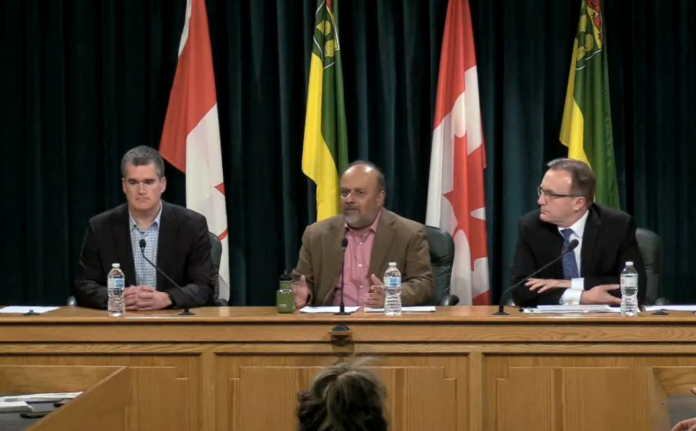
The Saskatchewan Party denied the existence of systemic or foundational problems in the province’s long term care homes Monday amidst growing pressure from critics.
The NDP and Sask. Party have been butting heads on the issue of long term care homes since last week when the opposition accused the government of doing away with minimum standards and replacing them with unenforceable regulations.
The province says the regulations are the minimum standards and when facilities fall short, they’re held to account.
Meanwhile, an annual report that sees senior health authority leadership tour the province’s long term care facilities to document concerns and successes was released quietly Friday.
The NDP had been asking for the report, which used to be authored by CEOs of each of the regional health authorities.
With one provincial health authority, senior regional staff now conduct the inspections.
The report was released without an executive summary or a press conference Friday afternoon.
“That’s what governments tend to do when they want it not to be noticed,” Meili said Sunday.
“We hear all the time …. How difficult it is (for staff). How little time they have to spend with residents, how many problems there are in their ability to deliver care when there just aren’t the resources available to take care of seniors the way we need to.”
“We hear all the time …. How difficult it is (for staff). How little time they have to spend with residents, how many problems there are in their ability to deliver care when there just aren’t the resources available to take care of seniors the way we need to,” Meili added.
The report detailed each long term care home individually. While the report didn’t identify any overarching trends, many facilities noted concerns with staffing and resource levels.
The NDP said that backs up their point — that homes are woefully understaffed, underresourced and need to be held to higher standards.
Meili said the report showed “patterns of rushed and inadequate care directly related to chronic understaffing.
“The people working there are doing everything they can, but they have nowhere near the human resources” required, he added, and are working in places with serious infrastructure concerns. He reiterated his call for the Sask. Party to be honest about problems in long-term care, to implement legislated minimum standards and ensure long-term care and home care are adequately staffed and funded.
“This report confirms everything we already know about long-term care that people have been telling us for years — that staff work so hard to meet their residents’ needs and they want to be there and love their job and leave at the end of every day frustrated that they can’t …. Do what they need to do for residents in their care,” said Danielle Chartier, the NDP critic for seniors.
“I hear from folks on a regular basis about these challenges. This report points to the environment of underfunding, understaffing and crumbling infrastructure. We need adequate funding so facilities can put in place those minimum standards so the people who built this province have the dignity and the care they need in the last years of their lives.”
The province and the SHA had a different conclusion when they reviewed the report.
SHA CEO Scott Livingstone said there is consistency around the challenges faced across the province, but cited an aging population and the challenge of a growing number of residents with neurological disorders.
“I don’t think we’re seeing systemic or fundamental flaws in the Saskatchewan system,” said Livingstone.
“I would say that some of the light is shining on other opportunities as well, but that doesn’t mean there isn’t an opportunity for us to improve just because we’re getting good results during COVID-19. If we were seeing fundamental structure flaws, we would see similar results to what we would see in other jurisdictions.”
Reiter said finances play a part in ensuring proper care. Since coming to power, he said the Sask. Party has increased funding to long term care centres by 45 per cent, and that over 700 frontline staff have been added since 2007.
He acknowledged that one challenge, though, is having a consistent staff.
Livingstone attributed that challenge to the province’s geography, and he said it’s one faced by all sectors of the province’s health system, not just long-term care.
“One of the challenges with staffing health care across the province is about getting the right personnel with the right training in the right place at the right time,” he said.
He said, traditionally, many staff members work part-time in lots of different facilities, which leads to problems with consistency. Since COVID-19, though, staff have been cohorted and only work in one home at a time. He said it would be interesting to see if that could continue post-pandemic.
“We’re always striving to make sure there’s adequate staffing. There are always going to be concerns about short staffing.”
But that’s not how critics characterize it.
Meili was surprised how critical the report was, especially given it’s writing by senior staff who are attending scheduled visits. He believes if the report were to be done by an independent, third-party during a random spot-check an even more severe picture would be painted.
“I think it’s striking that with a report that is so closely associated with the ministry, there are still this many damning statements, says a lot about the conditions and steps up the need for a more independent, objective review,” he said.
“The consistency of the message — community after community after community where the report was there was not enough staff to meet resident needs and the feeling that families can’t be confident in the care people are getting — the fact that this is an across the board experience … speaks really loudly to the failures to adequately resource long-term care.

